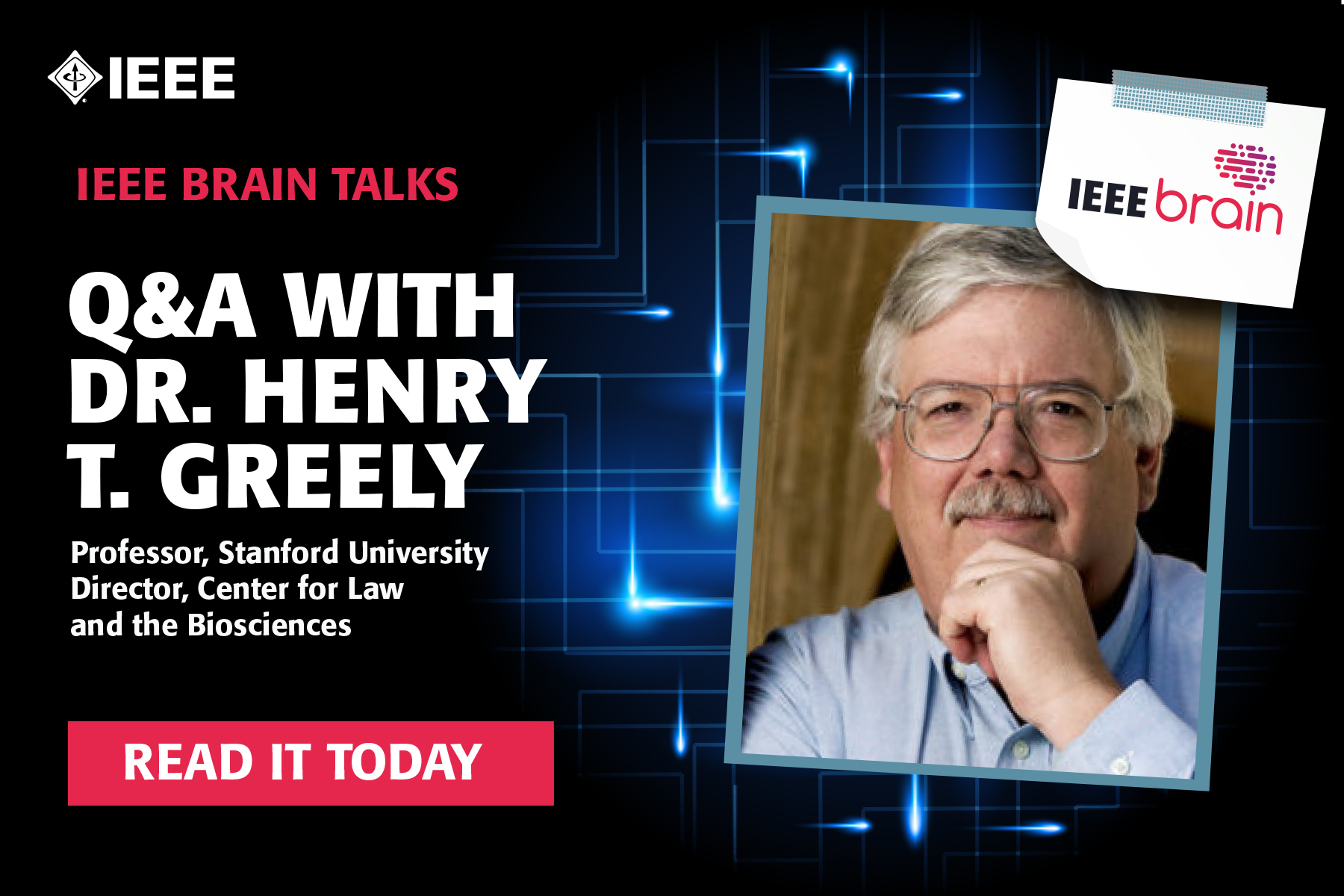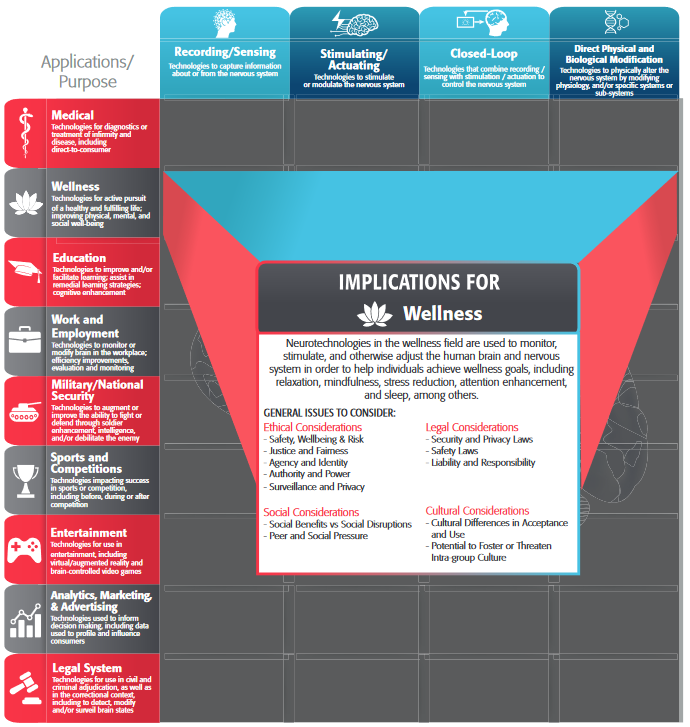Hank Greeley, a Law Professor at Stanford, has worked the last 25 years on ethical, legal and social implications of advances in the biosciences, genetics, neuroscience, stem cell research, assisted reproduction, and more. During the past 16 or 17 years, a primary focus for Greeley has been issues related to the study of the human brain. Professor Greeley is currently the President of the International Neuroethics Society and has been working on Neuroethics since 2002.
How does law intersect with the brain? For instance, what are some of the challenges or issues that have come to light?
Hank Greeley: Law is all about brains, or to be fair, law is all about minds. Yet, neuroscience teaches us that minds are created mainly by the interaction of brains with other things, but without brains, there are no minds. As we learn more about the brain and how it works, how it works right, how it works wrong, how it can be influenced, how it can be changed, these are things that the law is going to address in lots of different ways. For example, if you could predict which one in a hundred 12-year-old boys is going to turn out to be a psychopath, that could be interesting. If you could predict who’s going to get Alzheimer’s disease, that could be interesting to an employer or a long-term care insurer. Mindreading would be useful to tell whether someone was really in pain when applying for disability coverage, or whether they’re faking it or exaggerating it. Those are just a few examples, but there’s much more.
Is there an area where you see more ethical issues in play?
Hank Greeley: Well, the funding for brain study isn’t coming because institutions want to give my friends a chance to learn cool stuff. We want to prevent, treat and cure terrible mental illnesses and neurological diseases that are an incredible source of human suffering, both for those who have them and their loved ones. So, it’s all about figuring out how to fix brains, but what happens if people start trying to use those tools and that knowledge to fix brains in ways that aren’t diseased? What if you could make a person a Republican or a Democrat, or make them religious or not religious, or make them gay or straight. This raises ethical issues whether it’s done with or without consent. For example, if there was a safe and effective surgery that could change a dangerous criminal to a respectable citizen, should a judge be able to sentence him to that, as opposed to sentencing him to prison? This, when we already know the safety and efficacy of prison is, in fact, unsafe and ineffective. So, changing minds by changing brains brings up a whole set of issues.
And then there is another set of questions around advancement. It’s not about trying to change personalities so much, but more about providing cognitive enhancements. This raises a host of issues that people feel very strongly about. One could imagine a situation where something could be done to improve or enhance a witness’s memory when giving testimony. We’ve tried that with hypnosis, but it didn’t work out very well. But if we could actually make it work, that would be useful in the legal system. More broadly the legal system will inevitably be involved in deciding whether this is illegal or whether this will inevitably be involved in deciding when and under what circumstances using enhancements might be legal or not. So I think neuroscience and law are inextricably intertwined. The place where they meet is in that roughly three pounds brain matter inside our skulls.
You talk about law and neuroscience being connected; how did a law professor get here?
Hank Greeley: I was working largely on Health Law, particularly on Health Policy, and back in 1991-92, Stanford was hosting a big three-day symposium on the then new Human Genome Project. The organizers wanted some law professor on it. So, I got involved and I got intrigued by it. Where Health Policy as a field kind of crashed and burned, the genome stuff took off with the Human Genome Project. In effect, I got pushed into the pool, and I’ve never wanted to get out. I enjoy science and like learning about it. Genetics directly led me to neuroscience in the sense that about ten years after I started working on genetics, somebody asked me, “Well, what do you think about, you know, what’s happening with neuroscience?” And I started thinking about some of the issues that come up with genetics that apply to neuroscience like prediction, for example. Most of the concerns about genetics are tied to our ability to predict things. Well, neuroscience is going to help us predict things. But then I also started thinking about the things that are different. For instance, genetics could be a lie detector in a way that maybe neuroscience can’t. So, it was a combination; it was a move from genetics into neuroscience pushed by the things that were clearly in common between the two. That was my way of getting into it, but then branching out into the things that were different.
Any advice you’d offer students who might be interested in this area?
Hank Greeley: Do it! Just do it! One piece of advice that comes with a conflict of interest notice is join the International Neuroethics Society. I’m the President and we offer reduced rates for students. Our website will help you better understand what the field is and give you information to learn more about it. But I think in general, keep your eyes open and keep them pointed in opposite directions. Keep an eye on the science, but also keep an eye on the society. Worry about things such as taking human neural organoids and transplanting them into rats. Where could that lead? If you did it into monkeys, do you end in “Beyond the Planet of the Apes”? What’s the public reaction to this going to be like? And will that have effects for funding science? Read both the scientific literature in the back of Science and Nature, but also some of the news stories and the commentaries and the policy forums in the front and use your knowledge of neuroscience. Use your knowledge of that to talk to ordinary people who don’t have that knowledge and see what worries them. Where they think things are going and what scares them. That’s important, even if it’s not realistic. “Beyond the Planet of the Apes” is not realistic. People being afraid of human/non-human chimeras is realistic, and in fact, NIH currently has a funding moratorium on some sort of human/non-human chimera research because of political concerns.
It’s important to pay attention to the worlds that you’re in, the world of science, the cultural world in which it’s embedded; and no matter how dedicated you are as a scientist, always remember, science cannot do this independent of its culture. It cannot do things the culture says are illegal. It also cannot do things unless somebody’s willing to hire people to do them, or fund their grants, or give them tenure. Science and culture are inextricably intertwined, just as our brain and mind. And knowing a little bit about both of them is really important. People who know a lot about both of them are in a very unusual and advantageous position where they can help both culture and science at the same time.



